On June 29, Minister of Public Works and Infrastructure, Hon. Sihle Zikalala, visited the Expanded Public Works Program (EPWP) project in Okhahlamba Local Municipality, KwaZulu-Natal. The visit was part of the EPWP Pre-Presidential Imbizo, an event to engage with local community members and assess the progress of government initiatives.
The Okhahlamba Incentive Grant Waste Management Project
Minister Zikalala visited the Okhahlamba Incentive Grant Waste Management Project, which has 99 participants, including women and young people, who carry out a variety of tasks to improve the local community. The project demonstrates the government’s commitment to inclusivity and community development.
The EPWP and Community Development
The visit to the EPWP project in Okhahlamba Local Municipality is a reflection of the importance placed on community development by the government. It shows the government’s commitment to ensuring the success of such projects and their positive impact on the lives of ordinary citizens.
The EPWP and South African Society
The Expanded Public Works Program (EPWP) is a flagship initiative of the South African government since its launch in 2004. The program aims to provide temporary employment and training opportunities to citizens, particularly those who are unemployed or underemployed. The EPWP has been successful in creating millions of job opportunities across various sectors and contributing to social development.
Okhahlamba Local Municipality
Okhahlamba Local Municipality, located in KwaZulu-Natal, is a diverse region with a rich history and a melting pot of cultures, languages, and traditions. The area is an ideal location for government initiatives that aim to uplift and empower communities. The implementation of the EPWP project in this municipality is a prime example of government intervention to improve the quality of life for the inhabitants.
Minister Sihle Zikalala’s visit to the EPWP project in Okhahlamba Local Municipality highlights the government’s dedication to improving the lives of South African citizens through community development initiatives. The visit serves as a reminder of the potential for progress when local communities and government collaborate for the greater good. Initiatives like the EPWP are crucial in providing a lifeline to struggling communities, contributing to social development and positive change.








